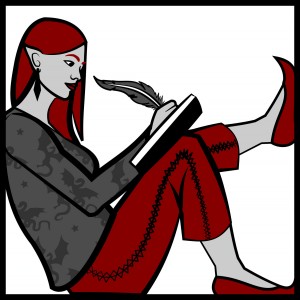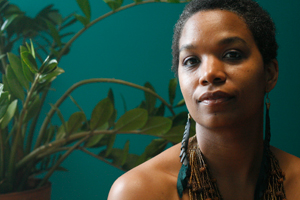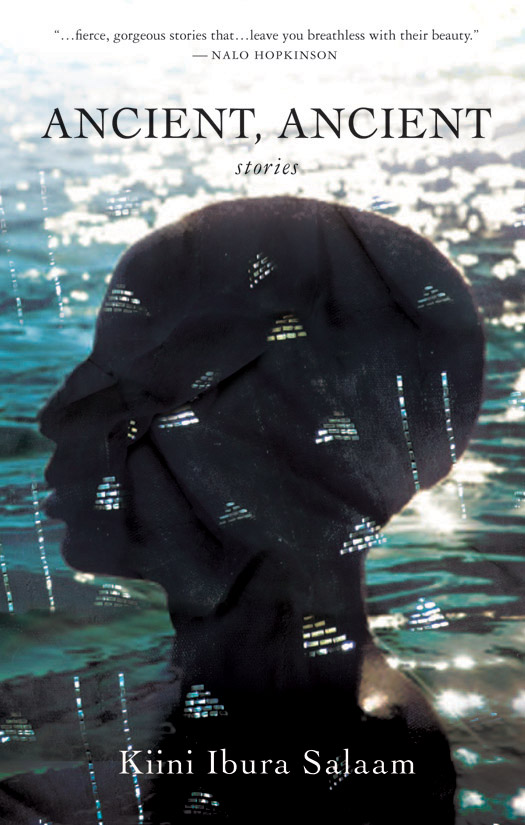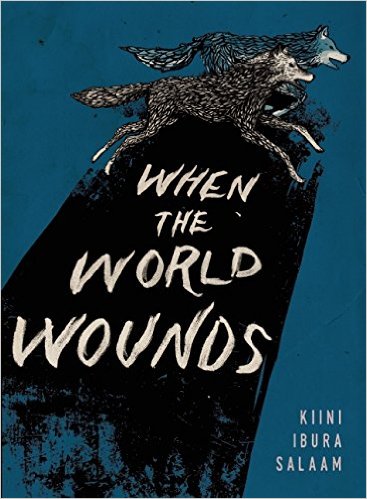We’re pleased to bring you the first in a series of candid, in-depth interviews with this year’s Sirens Guests of Honor. We’ll cover a variety of topics relevant to Sirens with each author, from their inspirations, influences, and craft, to the role of women in fantasy literature as befits our 2016 focus on lovers and the role of love, intimacy, and sex. We hope these conversations will be a prelude to the ones our attendees will be having in Denver this October. Today, Faye Bi interviews Kiini Ibura Salaam.

FAYE: Reading Ancient, Ancient, I’m in awe of how you create a world in only a few brushstrokes—in each story, you use very little exposition and leave it to us as readers to experience what kind of story we’re reading. Where are we? What is magic? What is normal? What is happening? From the timelessness of “Desire” to the concrete details of New York in “Marie,” or to the futuristic setting of “Pod Rendezvous,” you transport us fully but economically. Can you tell us about your draw to speculative fiction, and your world-building process? Do you start from a character, theme, or setting—or a combination? How do you decide which details to include or withhold?
 KIINI: I rely on two different resources for world-building: imagination and logic. I’ve always been a what-if thinker. As I move through the world, I’m wondering who people are, layering stories onto everyday life. I wonder what if we could fly; what if we transferred souls when we look at each other; what is this random person’s superpower? World-building is an extension of this what-if thinking. I usually start with a situation—the combination of a character and a conflict—and let my imagination go wild. But then, as I continue to go deeper into the world, I start to filter my imagination through logic. What is possible in this world, what is impossible?
KIINI: I rely on two different resources for world-building: imagination and logic. I’ve always been a what-if thinker. As I move through the world, I’m wondering who people are, layering stories onto everyday life. I wonder what if we could fly; what if we transferred souls when we look at each other; what is this random person’s superpower? World-building is an extension of this what-if thinking. I usually start with a situation—the combination of a character and a conflict—and let my imagination go wild. But then, as I continue to go deeper into the world, I start to filter my imagination through logic. What is possible in this world, what is impossible?
I’m also a very sensory writer. I like to feel what I’m writing and have a story filter in visually and emotionally rather than intellectually. To that end, I use my intuitive reaction to the words on the page to determine how much I need to say. I write what feels good, then I go back and edit based on how well the words communicate the world and guide the reader through the maze of plot. The worlds we build are tricky—they can have the qualities of a mirage. When we craft them, they can seem as solid and as glittering as the Taj Mahal. Hopefully, when we go back to edit, we can see the holes, the places where it’s more ghostly and less reliable, but sometimes both successes and failures in writing are accidents as we work through the process of refining the words on the page.
FAYE: Speaking of “Marie,” that story in particular guts me from head to toe. It has a mythic quality about it, not too unlike Rumpelstiltskin. Marie is forced to choose between taking away the constant pain and discomfort she experiences when others assume her racial identity for her and then payback is demanded in the form of her future child. But it’s not really a choice for her, is it? How do your experiences inform your work, in “Marie” or any of your other stories?
KIINI: Yes, in the case of Marie, she doesn’t have a choice—this decision is forced on her. In some way, she lived her life trying to avoid making a choice, trying to hide away from the inconvenience of her identity. She made her choice before the mysterious woman appeared in her life. Choice is not just about what we do in any one moment, it’s about the way we live our lives—whether through avoidance, inaction, or opposition, we are always making choices—and our choices always take shape in our futures, often in ways we don’t expect or desire.
 All my stories represent my perspective on life and the challenges of navigating our worlds. Many of the stories in Ancient, Ancient were influenced by my travels. So each one is firmly embedded in a place or time that impacted me: the Dominican Republic, Trinidad, Mexico, New Orleans, New York, my experiences in all of these places found their way onto the page. The triggering events of a story often don’t appear in the story—but as the writer, I know them. I know exactly the conversation, experience, person, circumstance that sparked the characters and incited the storytelling.
All my stories represent my perspective on life and the challenges of navigating our worlds. Many of the stories in Ancient, Ancient were influenced by my travels. So each one is firmly embedded in a place or time that impacted me: the Dominican Republic, Trinidad, Mexico, New Orleans, New York, my experiences in all of these places found their way onto the page. The triggering events of a story often don’t appear in the story—but as the writer, I know them. I know exactly the conversation, experience, person, circumstance that sparked the characters and incited the storytelling.
FAYE: Your female characters burst with vitality, life, and vengeance upon the page. They’re all unabashedly themselves or would like to be, sometimes confident and sometimes angry. What makes a Kiini Ibura Salaam heroine? What interests you most about writing women, specifically women at the intersection of black, Creole or alien (WaLiLa!)? Or as a daughter, mother, young woman or crone?
KIINI: I love people who live boldly. I think we all have parts of us that want to be free. Those are the characters that fascinate me most as well—characters who have impact, who have strong identities, who are pushing against the forces that would control them. Beyond that, writing is a very personal project. I do it in my most intimate and quiet moments—so the work I create during those moments needs to feed me. Creating work that reflects me, that speaks to my own life challenges, and celebrates my courage and my personhood is essential. Consequently, I write about what’s closet to me: being a woman—at all stages of womanhood; being alien—as a traveller, as a member of a reviled culture of people, being a southerner in a metropolis; being a human being who is fighting to live a life aligned with her soul identity.
FAYE: You’ve mentioned in other interviews that you’re working on a novel, and that you find the short story format more natural to write in. As you know, some writers are the opposite, preferring long-form storytelling. How does the longer form of a novel challenge you—transitions? Plotting and structure? Revisions? Tell us about your writing demons and how you’re vanquishing them.
KIINI: My struggles with novel writing is all about the length. I don’t really have an issue with the actual page count, but sustaining an arc over 200+ pages has been a bit challenging. It took me forever to convince myself to even try to write a novel, and when I finally did I struggled to get a handle on its massiveness. Halfway through my career, I did a distance learning MFA with the goal of cracking the novel form. I made amazing progress and continue to get closer to completing a novel. Publishing short stories has been a way to buck the “novel or nothing” thinking. I am constantly writing stories; I love stories, and publishing them has allowed me to honor myself as a writer and the work I have done over the years, and continue to do. I have a bunch of novel ideas in development now, and I predict you’ll be seeing a novel from me soon.
FAYE: About the creative life, you recently tweeted, “Being a writer—or any kind of artist for that matter—is like being saddled with an additional mission from god. On top of the need to create conditions for survival, there is this thing blaring in your mind—create, create, create.” How do you balance writing with, well, everything else? Do you have strategies for when and how you work?
 KIINI: When and how I work shifts based on my deadlines and the present state of my life. I have found great pleasure in managing to move the work forward without completely sequestering myself from life. It’s a total contradiction: you need time and focus to create; but myself as a writer, I need engagement and community to spark my imagination and fuel my energy. On top of which, I need money to pay bills and attention to dedicate to my child. I went through some very dark years when my daughter was young, when I couldn’t write and I tried to give writing back to God. That didn’t work! I was forced to find a way to make writing work in the edges of life—even though it is at the center of my identity and my vision/desire for myself. I edited my short story collection on the train while commuting to work. I have my work-intensive time periods, where I go straight from my house to a café and commit to writing/editing a certain page count. It’s all about math: the length of the work divided by the hours I can spare. My strategy is to be portable, to be modular, and to have faith. I’ve succeeded at continuing to write while I have all these other encroaching responsibilities by: being able to write anyway, breaking everything into pieces so that I’m not overwhelmed by the enormity of the task, and by believing that with continued, consistent, manageable effort, I can make big things happen. It’s working thus far, and it looks like I’m getting better at it. My first book was collected from years of work. My second book—When the World Wounds—was all newly written from 2013 on. It’s really like writers—all artists, really—house more than one entity inside their bodies. I have got to make the efforts to prove to myself that this is all doable. It’s my worker bee side convincing my dreamer side that together we can create magic!
KIINI: When and how I work shifts based on my deadlines and the present state of my life. I have found great pleasure in managing to move the work forward without completely sequestering myself from life. It’s a total contradiction: you need time and focus to create; but myself as a writer, I need engagement and community to spark my imagination and fuel my energy. On top of which, I need money to pay bills and attention to dedicate to my child. I went through some very dark years when my daughter was young, when I couldn’t write and I tried to give writing back to God. That didn’t work! I was forced to find a way to make writing work in the edges of life—even though it is at the center of my identity and my vision/desire for myself. I edited my short story collection on the train while commuting to work. I have my work-intensive time periods, where I go straight from my house to a café and commit to writing/editing a certain page count. It’s all about math: the length of the work divided by the hours I can spare. My strategy is to be portable, to be modular, and to have faith. I’ve succeeded at continuing to write while I have all these other encroaching responsibilities by: being able to write anyway, breaking everything into pieces so that I’m not overwhelmed by the enormity of the task, and by believing that with continued, consistent, manageable effort, I can make big things happen. It’s working thus far, and it looks like I’m getting better at it. My first book was collected from years of work. My second book—When the World Wounds—was all newly written from 2013 on. It’s really like writers—all artists, really—house more than one entity inside their bodies. I have got to make the efforts to prove to myself that this is all doable. It’s my worker bee side convincing my dreamer side that together we can create magic!
FAYE: Lastly, tell us about a remarkable woman of fantasy literature—an author, reader, agent, editor, scholar, or someone else—who has changed your life.
KIINI: I’m not great with these “name somebody” questions. I’m a little cannibal. I consume books, ideas, inspiration and integrate it and then forget the moment of ingestion! I do write mostly fantasy, but spend a bit of time with sci fi as well. A remarkable woman of sci fi who has had a huge impact on legions of people is Octavia Butler. I love her work, her vision, and her fierce disinterest in her readers’ feelings—she is going to show you the harsh truths of the world and human nature whether you want to see it or not, but what I find most remarkable about her is her commitment to herself as a writer. Artists have to be the first and last believer in themselves. We have to believe in the value of our work before anyone else does. And when everyone stops believing, we still have to hold the torch of faith alive. No one would have ever heard of Octavia Butler if she didn’t decide to become a writer, then decide to remain a writer through years and years of anonymity and disinterest from publishers. She worked every job under the sun and did what she had to do to build her craft and develop her work. She is a self-made woman and a self-made artist. I admire that about her, but I also take instruction from it. We are not writing for the adulation of the world, we are writing to exercise our voices and fulfill the mandate within ourselves. If you believe and understand that, you’ll be okay. Through the rejections, disinterest, and lost opportunities; through being overlooked, ignored, or ridiculed, if you can remember that you are where it begins and ends, you’ll develop yourself into a writer worthy of your own company.
Kiini Ibura Salaam is a writer, painter, and traveler from New Orleans, Louisiana. Her work encompasses speculative fiction, erotica, creative nonfiction, and poetry. Kiini’s writing is rooted in eroticism, speculative events and worlds, and women’s perspectives. Her speculative fiction has been included in publications such as Dark Matter, Mojo: Conjure Stories, Dark Eros, FEMSPEC, Ideomancer.com, infinitematrix.com, and PodCastle.org. Her first short fiction collection, Ancient, Ancient, was co-winner of the James Tiptree, Jr. Award in 2012; a collection titled When the World Wounds will be released in 2016. Kiini’s creative nonfiction speaks to her two passions: the freedom of women and the freedom of the creative spirit. In essays about date rape, sexual harassment, and the power of the word “no,” Kiini explores the complex layers of societal norms that negatively impact women’s lives. These essays have been published in Essence, Ms., and Colonize This! Her creative nonfiction has been included in college curricula in the areas of women’s studies, anthropology, history, and English. For the past ten years, Kiini has written the KIS.list, an e-column that explores the writing life and encourages readers to fulfill their dreams. She works as an editor and copyeditor in New York.
For more information about Kiini, please visit Kiini’s website, blog, or Twitter.







Connect with the Sirens community
Sign up for the Sirens newsletter